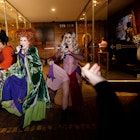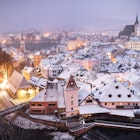

Dundee's new V&A is a spectacular addition to the city skyline В©
Dundee isn't an obvious destination in a country with so much to offer, but Scotland's fourth largest city has big plans to transform its gritty, post-industrial landscape into a thriving hub of culture and design excellence, and one project is spearheading those changes: the new V&A. Opening in September 2018, Kengo KumaвҖҷs awesome, space-age museum is the crown jewel in an urban redevelopment thatвҖҷs turning heads both at home and abroad.

A city in transition
I arrive on a frosty Sunday evening and make my way to and a front row view of the new . The setting sun burnishes the River Tay to a brassy sheen and turns the museumвҖҷs concrete strata a glowing shade of gold. It takes its inspiration from the Arbroath cliffs and looks both ancient and modern; somewhere mid-way between a pyramid and a space ship, its deep-set, vaulting portico inviting you into unknown worlds, its prow jutting out over the water beside Antarctic adventurer Captain ScottвҖҷs RSS Discovery as if itвҖҷs about to cast off and accompany the tall ship on new voyages.
ThereвҖҷs no doubt the V&A, a sibling for the original Victoria & Albert Museum in London, the world's largest decorative arts collection, is a triumph, but itвҖҷs also a catalyst for much bigger things. It sits in the centre of a ВЈ1 billion waterfront redevelopment that kicked-off in 2001 and has swept away an ugly tangle of ill-planned roads and offices and replaced them with Slessor Park, a new train station and a rapidly emerging mix of hotels, offices and restaurants such as .
For half a century, the city turned its back on these dockyards but now the connection with the river has been restored, the museum tempting Dundonians back to Craig Harbour for new explorations and a celebration of Scottish design. Getting to this point has required a lot of graft, but you get the sense that everyone in Dundee has pitched in. A case in point is (ScotlandвҖҷs only repertory theatre), completed in 1976 thanks to a public appeal that raised ВЈ200,000 on land donated by the University of Dundee. Likewise, Dundee Contemporary Arts (DCA) arose from an old car park to become one of the most successful arts organisations in the UK, with an award-winning learning centre and the buzzy .

As well as approving the Waterfront Masterplan and the new V&A, in the last 25 years Dundee Council has facilitated the creation of , a multi-purpose performance venue for the Scottish School of Contemporary Dance; a ВЈ2 million redevelopment of ; and a conservation-award-winning restoration of High Mill at the historic Verdant Works jute textile museum. Passionate about his home town, Cllr John Alexander tells me, 'we have an opportunity over the next few years to change Dundee forever and we canвҖҷt miss that.' As the youngest council leader in Scotland (heвҖҷs just 29) presiding over a city with the highest proportion of 18 to 29-year-olds in the country, he has a big stake in that future.
A cultural bridge
Until now, DundeeвҖҷs best loved museum has been the McManus, a 150-year-old Gothic Revival jewel designed by George Gilbert Scott (who built LondonвҖҷs St Pancras Station). A library and gallery devoted to the advancement of science, literature and art, its Gothic balustrades, stained glass windows and pyramidal roof turrets speak to the cityвҖҷs self-confidence when it was riding high on 19th-century trade, shipbuilding, jute milling and whaling.

When I visit on a misty Monday morning, the galleries are full of families absorbed in the вҖҳMaking of Modern DundeeвҖҷ exhibit. Parents and grandparents point to hand-loom mill shuttles, ship models, pots of KeillerвҖҷs marmalade and sweets, ZX Spectrum computers and NCR cash registers that they once made, used or bought. ItвҖҷs striking to see вҖ“ a museum full of artefacts crafted by many of the museum-goers, a live lesson in how culture connects people not only with history, but with previous generations.
It is these broader connections that Director Philip Long is most interested in fostering at V&A Dundee. He sees the museum not as some temple to high design, but as a dynamic, living institution with important work to do reconnecting Dundonians with their manufacturing heritage while also showcasing ScotlandвҖҷs globally significant design contribution to international visitors who know little or nothing about it. The museumвҖҷs first show, Ocean Liners: Speed & Style, is aptly chosen. These floating palaces were the technological marvels of their age, symbols of national pride, and much of their cutting-edge technology and beautifully crafted interiors were designed by Scottish engineers and artists.

Beyond the amazing objects, some never seen before, are two dedicated learning rooms and a Michelin Design Gallery supported by the city-based company keen to collaborate in a mentoring programme. ThereвҖҷs important outreach work, too, like the and the brilliant project, which brought leading Scottish milliners from DundeeвҖҷs historic guild to schools in Hilltown (once Bonnet Hill) in order to research the local design history and produce contemporary bonnets. DundeeвҖҷs design story isnвҖҷt just a bridge to the past, but a path to the future.
Designing a city fit for the future
DundeeвҖҷs burgeoning renaissance from one of ScotlandвҖҷs most deprived cities is a design story in itself вҖ“ a conscious decision to craft a path to a more prosperous future based on cultural investment and the creative economy. After all, the city turns out some of the UKвҖҷs best designers, video game developers, graphic artists, animators, dancers, choreographers and biomedical pioneers creating next-generation drugs. ItвҖҷs a rich well of creative capital that Unesco recognised in 2014, when it awarded Dundee City of Design status.
In May, the award is celebrated with the . In 2017 a jam-packed programme of events, workshops and exhibits was hosted in the former print works of DC Thomson, publishers of popular childrenвҖҷs comics The Beano and The Dandy. The festival showcases the work of local designers вҖ“ this year there is a Fashion Show and designer collaborations with factories such as Turnberry Rug Works вҖ“ and acts as a springboard for projects with fellow design cities like Detroit and Shenzhen.

Attracted by the cityвҖҷs new can-do attitude, locals like Duncan Alexander are returning home. In 2016, he opened craft brewery in the defunct Blackness foundry, which you can visit for tours and tastings. It sits near Verdant Works and the which provides space to young artists whose work you can buy direct. There are plans for food trucks in the foundry and a collaboration with street art collective, , whose mission is to create a mural trail that guides visitors to the cityвҖҷs creative hotspots through tours and DIY mural maps.
On my last day, I drive out to the picturesque suburb of Broughty Ferry for lunch at Adam NewthвҖҷs refined beachside restaurant, . ItвҖҷs a beautifully sunny day and the River Tay sparkles in the sunlight. Dolphins swim here in summer and across the water is , a thick swathe of beachside pine forest. People are playing with their dogs on the beach and my plate of sustainably-sourced Scrabster Coley is delicious. Dundee, both for design and much more, is definitely worth a trip.
Paula Hardy travelled to Dundee with the support of and . ПгёЫБщәПІКјҙКұҝӘҪұ contributors donвҖҷt accept freebies for positive coverage.
Explore related stories


 Festivals & EventsChristmas dinners around the world: choose your favorite festive dishes
Festivals & EventsChristmas dinners around the world: choose your favorite festive dishesNov 22, 2024 вҖў 5 min read
 Destination PracticalitiesA first-time guide to the Grand Egyptian Museum
Destination PracticalitiesA first-time guide to the Grand Egyptian MuseumNov 22, 2024 вҖў 8 min read

 BeachesThese 5 day trips from Sydney will show you the splendors of New South Wales
BeachesThese 5 day trips from Sydney will show you the splendors of New South WalesNov 22, 2024 вҖў 7 min read

 Destination PracticalitiesDo you need a visa to visit Thailand? HereвҖҷs everything to know
Destination PracticalitiesDo you need a visa to visit Thailand? HereвҖҷs everything to knowNov 22, 2024 вҖў 8 min read



